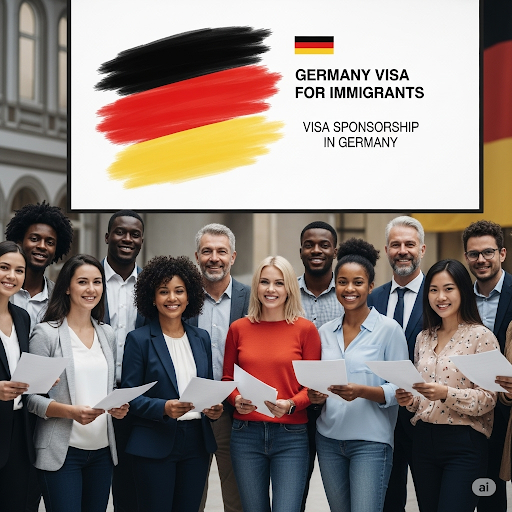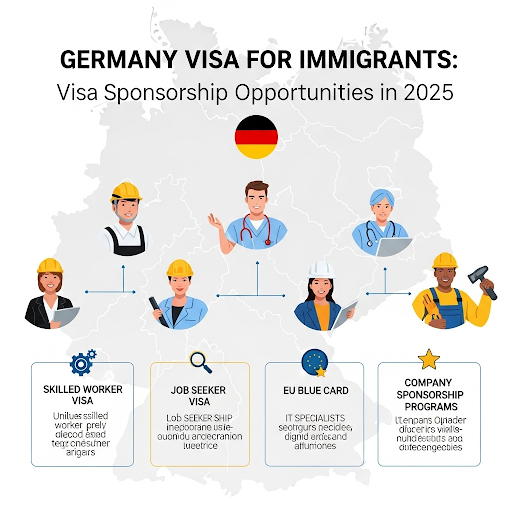Germany stands as one of Europe’s most attractive destinations for immigrants, offering robust economic opportunities, world-class education systems, and a high standard of living.
As the continent’s economic powerhouse, Germany actively seeks skilled professionals, students, and entrepreneurs to contribute to its diverse and dynamic society. Understanding the visa application process and sponsorship opportunities is crucial for anyone considering making Germany their new home.
The German immigration system provides multiple pathways for different categories of applicants, from highly skilled professionals to students and family members.
With recent reforms to immigration laws, including the introduction of the Skilled Immigration Act and the EU Blue Card program, Germany has streamlined many processes to attract international talent.
This comprehensive guide will navigate you through the complexities of German visa requirements, sponsorship opportunities, and the step-by-step application process.
Understanding German Immigration Categories
Germany’s immigration framework is designed to accommodate various types of immigrants based on their qualifications, purpose of stay, and contribution potential to German society. The system prioritizes skilled workers while maintaining pathways for students, entrepreneurs, and family reunification cases.
The primary immigration categories include employment-based visas for skilled professionals, student visas for educational purposes, family reunification visas for spouses and dependents, and investment-based visas for entrepreneurs and investors.
Each category has specific requirements, processing times, and benefits that applicants must understand before beginning their application journey.
Recent legislative changes have made Germany more accessible to international talent. The Skilled Immigration Act, implemented in 2020, expanded opportunities for non-EU citizens with professional qualifications.
Additionally, the recognition of foreign qualifications has been simplified, making it easier for skilled professionals to have their credentials acknowledged in Germany.
Employment-Based Immigration
Employment-based immigration represents the most common pathway for skilled professionals seeking long-term residence in Germany. This category encompasses several visa types, each designed for specific skill levels and employment situations.
The system prioritizes individuals with in-demand skills, particularly in sectors experiencing labor shortages such as healthcare, engineering, information technology, and skilled trades. German employers actively recruit international talent to fill these gaps, often providing comprehensive support throughout the visa application process.
Key employment-based visa categories include the EU Blue Card for highly qualified professionals, general work permits for skilled workers, and specialized visas for researchers, artists, and seasonal workers. Each category has distinct qualification requirements, salary thresholds, and processing procedures that applicants must carefully consider.
Student and Academic Pathways
Germany’s reputation for excellence in higher education makes it a premier destination for international students. The country offers numerous opportunities for academic advancement, from undergraduate programs to doctoral research positions.
Student visas provide not only access to world-class education but also potential pathways to permanent residence. Many international students transition from academic programs to employment-based visas, leveraging their German education and language skills to secure long-term residence status.
The academic pathway includes opportunities for researchers, visiting scholars, and participants in exchange programs. Germany’s research institutions and universities actively collaborate with international partners, creating numerous sponsorship opportunities for qualified academics and researchers.
Types of German Visas and Permits
Understanding the various types of German visas and permits is essential for selecting the most appropriate pathway for your specific situation. Each visa type serves different purposes and offers distinct advantages and limitations.
The German visa system distinguishes between short-term visas for temporary stays and long-term permits for extended residence. Most immigration-focused applications fall under long-term categories, which eventually lead to permanent residence and potential citizenship opportunities.
EU Blue Card
The EU Blue Card represents Germany’s premier visa option for highly qualified professionals from non-EU countries. Designed to attract top international talent, this program offers accelerated pathways to permanent residence and numerous benefits for qualified applicants.
To qualify for an EU Blue Card, applicants must possess either a university degree or five years of relevant professional experience in their field. Additionally, they must secure a job offer with a salary meeting specific thresholds, which vary by profession and region within Germany.
Benefits of the EU Blue Card include:
- Accelerated permanent residence eligibility after 21 months with German language proficiency or 33 months without
- Freedom to travel within the EU for short-term business purposes
- Simplified family reunification procedures for spouses and children
- Access to social benefits and healthcare systems
- Potential pathway to German citizenship after meeting residency requirements
The application process requires comprehensive documentation, including educational credentials, professional certifications, employment contracts, and proof of financial stability. Processing times typically range from 2-4 months, depending on the applicant’s country of origin and completeness of documentation.
General Work Permit (Aufenthaltserlaubnis)
The general work permit serves as the standard employment-based visa for skilled workers who may not qualify for the EU Blue Card. This category accommodates a broader range of professions and salary levels while still requiring legitimate employment offers from German employers.
Qualification requirements include recognized professional training or relevant work experience in the intended field of employment. Unlike the EU Blue Card, salary thresholds are generally lower, making this option accessible to a wider range of skilled professionals.
Key features of the general work permit include:
- Initial validity periods of 1-4 years, depending on employment contract duration
- Possibility for renewal and eventual permanent residence application
- Access to German social security systems and healthcare
- Opportunity for family members to join the visa holder in Germany
- Freedom to change employers with proper notification and approval
The application process involves close coordination between the applicant and their prospective German employer. Many employers assist with documentation preparation and may provide support letters explaining the necessity of hiring international talent.
Job Seeker Visa
Germany’s Job Seeker Visa offers qualified professionals the opportunity to enter the country specifically to search for employment. This innovative program recognizes that many skilled workers prefer to conduct their job search while present in Germany, allowing for better networking and interview opportunities.
Eligibility requirements include university degree or equivalent professional qualification, relevant work experience, proof of financial resources to support the stay, and adequate health insurance coverage. The visa allows a maximum stay of six months for job searching activities.
Advantages of the Job Seeker Visa include:
- Opportunity to attend interviews and networking events in person
- Better understanding of German job market and employer expectations
- Ability to demonstrate commitment to potential employers
- Direct conversion to work permit upon securing employment
- No requirement for specific job offer before application
Successful job seekers can transition directly to appropriate work permits without leaving Germany, streamlining the overall immigration process and reducing administrative burdens.
Student Visa and Academic Opportunities
Student visas provide access to Germany’s renowned education system while offering potential pathways to permanent residence. International students can pursue undergraduate, graduate, and doctoral programs at German universities and research institutions.
Application requirements typically include acceptance letter from recognized German educational institution, proof of financial resources, health insurance coverage, and adequate German or English language proficiency depending on program requirements.
Benefits for international students include:
- Access to high-quality education at relatively low costs
- Permission to work part-time during studies
- Extended residence permits for job searching after graduation
- Simplified transition to employment-based visas
- Exposure to German language and culture
- Networking opportunities with potential employers and colleagues
Post-graduation, students receive extended residence permits specifically for job searching, allowing them to leverage their German education and connections to secure employment-based visas.
Visa Sponsorship Process in Germany
Visa sponsorship in Germany involves collaboration between prospective immigrants, German employers or institutions, and government authorities. Understanding this process is crucial for successful application outcomes and timeline management.
The sponsorship process varies significantly depending on the visa category and specific circumstances of each case. However, common elements include employer involvement, documentation preparation, government review procedures, and final decision implementation.
Employer Sponsorship Requirements
German employers play a crucial role in the visa sponsorship process for employment-based applications. They must demonstrate legitimate business needs for international hiring and comply with various legal and administrative requirements.
Employer obligations typically include:
- Demonstrating inability to fill positions with German or EU citizens
- Providing detailed job descriptions and qualification requirements
- Offering competitive salaries and working conditions
- Assisting with visa application documentation
- Complying with integration and reporting requirements
- Supporting employee settlement and adaptation processes
Many German companies have dedicated human resources departments experienced in international hiring and visa sponsorship processes. These employers often provide comprehensive support throughout the application process and during initial settlement periods.
Educational Institution Sponsorship
Universities, research institutions, and educational organizations frequently sponsor international students, researchers, and academic professionals. These institutions have established procedures for supporting visa applications and ensuring compliance with educational visa requirements.
Institutional support typically includes:
- Issuing official acceptance letters and enrollment confirmations
- Providing guidance on visa application procedures
- Assisting with housing and settlement arrangements
- Offering orientation programs for international participants
- Facilitating connections with local communities and support networks
- Providing academic and career counseling services
Many German universities have international offices specifically dedicated to supporting foreign students and researchers throughout their stay in Germany.
Application Process Step-by-Step
The German visa application process follows a structured approach designed to ensure thorough evaluation of each case while maintaining reasonable processing times. Understanding each step helps applicants prepare effectively and avoid common pitfalls.
The process typically begins with preliminary eligibility assessment and document preparation, followed by formal application submission, review and processing by German authorities, and final decision implementation. Each step requires careful attention to detail and adherence to specific requirements.
Preliminary Preparation Phase
Successful visa applications begin with thorough preparation and planning. This phase involves researching visa options, assessing eligibility, gathering required documentation, and establishing connections with potential sponsors or employers.
Key preparation activities include:
- Eligibility Assessment: Carefully review qualification requirements for different visa categories and honestly assess your credentials and experience against these standards.
- Document Collection: Begin gathering required documents early, as some items may take weeks or months to obtain, particularly educational credential evaluations and criminal background checks.
- Language Preparation: Start learning German or improving existing language skills, as proficiency can significantly impact both application success and integration success.
- Financial Planning: Calculate total costs including application fees, living expenses, and settlement costs, ensuring adequate financial resources are available.
- Professional Networking: Begin connecting with German employers, professional associations, and other relevant networks in your field.
Document Preparation and Authentication
German visa applications require extensive documentation, and proper preparation is crucial for application success. Documents must be authentic, current, and properly translated and authenticated according to German requirements.
Essential documents typically include:
- Valid passport with adequate remaining validity
- Educational certificates and transcripts
- Professional certifications and licenses
- Employment contracts or job offers
- Financial documentation proving adequate resources
- Health insurance coverage verification
- Criminal background checks from all countries of residence
- Passport photographs meeting German specifications
- Completed application forms with accurate information
All foreign documents must be translated into German by certified translators and authenticated through apostille or consular legalization procedures. This process can be time-consuming and expensive, so early preparation is essential.
Application Submission and Processing
Once all documentation is prepared, applications are submitted to the appropriate German consulate or embassy in the applicant’s country of residence. Some categories may allow for in-country applications after initial entry on temporary visas.
The submission process involves:
- Appointment Scheduling: Book visa appointments well in advance, as waiting times can be several weeks or months in some locations.
- Document Review: Consular officers review all submitted documentation for completeness and authenticity during the appointment.
- Interview Process: Some applicants may be required to attend interviews to discuss their application and intentions.
- Biometric Data Collection: Fingerprints and photographs are collected for visa processing and future identification purposes.
- Processing Period: Applications are reviewed by German immigration authorities, which may take several weeks to months depending on case complexity.
Decision and Implementation
After thorough review, German authorities issue visa decisions and communicate results to applicants. Successful applicants receive their visas and can begin planning their move to Germany.
Post-approval activities include:
- Travel planning and arrangements
- Initial settlement preparation including housing and banking
- Registration with local authorities upon arrival in Germany
- Integration course enrollment and language learning continuation
- Professional licensing or credential recognition where required
- Social security and healthcare system registration
Requirements and Eligibility Criteria
German visa requirements vary by category but generally emphasize professional qualifications, financial stability, and integration potential. Understanding these criteria helps applicants assess their eligibility and prepare accordingly.
Common requirements across most categories include clean criminal background, adequate financial resources, health insurance coverage, and basic German language proficiency for some visa types. Specific requirements depend on the chosen visa category and individual circumstances.
Educational and Professional Qualifications
Germany places significant emphasis on recognized qualifications and professional competence. Educational credentials must be evaluated and recognized according to German standards, particularly for regulated professions.
The recognition process involves:
- Credential evaluation by appropriate German authorities
- Assessment of educational equivalency to German standards
- Professional licensing where required by law
- Continuing education or additional training if necessary
- Language proficiency testing for certain professions
Many professions require specific licensing or certification in Germany, including healthcare workers, engineers, teachers, and legal professionals. The recognition process can take several months and may require additional training or examinations.
Financial Requirements
Applicants must demonstrate adequate financial resources to support themselves and any accompanying family members during their stay in Germany. Financial requirements vary by visa category and family size.
Typical financial documentation includes:
- Bank statements showing adequate savings
- Employment contracts with salary specifications
- Sponsorship letters from employers or institutions
- Proof of ongoing income sources
- Financial guarantees from German sponsors where applicable
Minimum financial thresholds are updated regularly and vary based on cost of living calculations and individual circumstances. Applicants should verify current requirements with German consular authorities.
Language Proficiency Requirements
German language proficiency requirements vary significantly by visa category and intended length of stay. While some categories do not require German language skills initially, proficiency becomes important for long-term integration and permanent residence applications.
Language requirements typically include:
- Basic German proficiency (A1-A2 level) for some family reunification cases
- Intermediate proficiency (B1-B2 level) for certain employment categories
- Advanced proficiency for regulated professions and citizenship applications
- English proficiency may be acceptable for some international positions
Many applicants begin German language learning before applying for visas, as language skills can significantly improve application competitiveness and settlement success.
Common Challenges and Solutions
The German visa application process, while well-structured, presents various challenges that applicants must navigate successfully. Understanding common issues and their solutions helps improve application success rates and reduces stress during the process.
Typical challenges include document authentication complexities, language barriers, lengthy processing times, and cultural adaptation requirements. However, with proper preparation and professional guidance, most challenges can be overcome effectively.
Documentation and Authentication Issues
Document preparation represents one of the most complex aspects of German visa applications. Requirements are strict, and any deficiencies can result in application delays or rejections.
Common documentation challenges include:
- Obtaining certified translations of foreign documents
- Completing apostille or consular authentication procedures
- Securing educational credential evaluations
- Obtaining criminal background checks from multiple countries
- Meeting specific formatting and validity requirements
Solutions involve early preparation, working with experienced translation services, and maintaining close communication with German consular authorities to ensure all requirements are met properly.
Processing Delays and Timeline Management
Visa processing times can vary significantly based on application complexity, consular workload, and individual circumstances. Applicants must plan accordingly and maintain realistic expectations about timelines.
Strategies for managing processing delays include:
- Submitting complete applications to avoid additional document requests
- Maintaining regular communication with consular authorities
- Having contingency plans for extended processing periods
- Keeping all documentation current and valid throughout the process
- Being prepared to provide additional information if requested
Integration and Settlement Challenges
Successful immigration to Germany extends beyond visa approval to include effective integration into German society and professional environments. Many immigrants face challenges adapting to new cultural norms, professional practices, and social expectations.
Common integration challenges include language barriers in professional settings, understanding German workplace culture, navigating bureaucratic procedures, and building social and professional networks. However, Germany offers extensive integration support including language courses, cultural orientation programs, and professional development opportunities.
Tips for Successful Application
Maximizing your chances of visa approval requires strategic planning, thorough preparation, and attention to detail throughout the application process. Following proven best practices can significantly improve application outcomes.
Successful applicants typically demonstrate clear motivation for choosing Germany, realistic integration plans, and genuine commitment to contributing to German society and economy. They also present well-organized applications with complete documentation and honest, accurate information.
Application Strategy and Planning
Developing a comprehensive application strategy involves assessing your qualifications objectively, choosing the most appropriate visa category, and timing your application optimally.
Key strategic considerations include:
- Selecting the visa category that best matches your qualifications and goals
- Timing applications to align with job market conditions and personal circumstances
- Building strong cases through additional qualifications or experience
- Seeking professional guidance when needed
- Maintaining flexibility and considering alternative pathways
Professional Support and Resources
Many successful applicants benefit from professional support throughout the application process. Immigration lawyers, consultants, and specialized agencies can provide valuable guidance and increase application success rates.
Professional support services include:
- Eligibility assessments and pathway recommendations
- Document preparation and review services
- Application submission and tracking assistance
- Communication with German authorities on behalf of applicants
- Settlement support and integration guidance
Long-term Residence and Citizenship Pathways
German visa approval represents the first step toward potential long-term residence and citizenship opportunities. Understanding the progression from temporary visas to permanent residence and eventual citizenship helps applicants plan their long-term futures in Germany.
The pathway typically involves transitioning from temporary residence permits to permanent residence status, followed by eligibility for German citizenship after meeting specific requirements including continuous residence, language proficiency, and integration demonstrations.
Permanent Residence Options
Most employment-based visa holders become eligible for permanent residence after several years of continuous legal residence in Germany. The specific timeline depends on visa category, with EU Blue Card holders eligible for accelerated processing.
Permanent residence benefits include:
- Indefinite residence rights in Germany
- Freedom to change employers without visa implications
- Access to all social benefits and services
- Simplified travel within the European Union
- Enhanced family reunification rights
- Foundation for eventual citizenship eligibility
Conclusion
German citizenship represents the ultimate integration achievement, offering full political and social participation rights. Citizenship eligibility typically requires eight years of continuous legal residence, though this period can be reduced through various qualifications including language proficiency and integration course completion.
Benefits of German citizenship include voting rights, unrestricted travel within the EU, full social and economic participation rights, and the security of permanent belonging in German society.
Germany’s evolving immigration landscape continues to create new opportunities for skilled professionals, students, and entrepreneurs seeking to build successful lives in one of Europe’s most dynamic countries. With proper preparation, professional guidance, and genuine commitment to integration, many immigrants successfully navigate the visa process and establish thriving careers and communities in Germany.
The key to success lies in understanding the system thoroughly, preparing meticulously, and approaching the process with realistic expectations and genuine enthusiasm for contributing to German society. As Germany continues to welcome international talent, those who invest the time and effort required for successful applications often find rewarding opportunities for personal and professional growth in their new home country.






